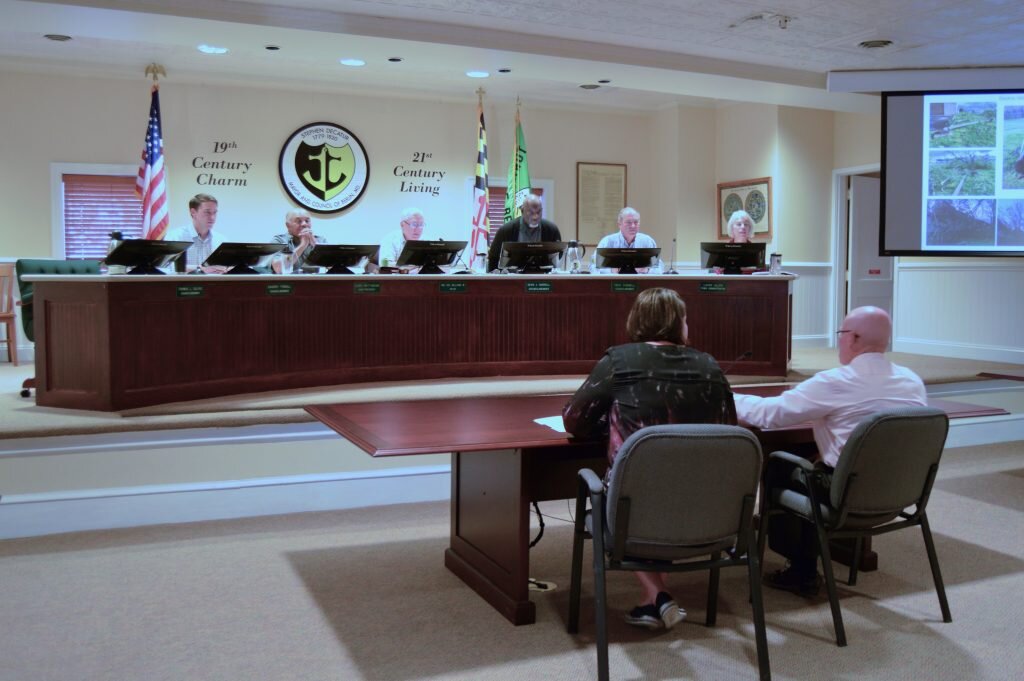Options range from painful to stretching out payments

Rachel Ravina/Bayside Gazette
Finance Director Natalie Saleh and Electric Utility Director Tim Lawrence present their budgets to the Town of Berlin’s Mayor and Council during a work session Monday night.
By Rachel Ravina, Staff Writer
(April 18, 2019) Budget discussions continued Monday evening as the Berlin mayor and council tackled the utility fund budget.
Finance Director Natalie Saleh said the overall utility budget for fiscal year 2020 consists of $9.1 million, down $2 million, or 18 percent, from the current year’s figure.
Mayor Gee Williams said the individual funds, or separate budgets, for electric, water, wastewater, and sewer utilities would be covered during the work session.
While stormwater is another town utility, Williams said he’d recommend temporarily delaying considerations of changing the annual fees for that, citing “comments from the public [that] all these increases are too much at one time.”
This talk comes on the heels of a general fund work session two weeks ago and a council meeting last week when members of the public expressed their ire over the possibility of substantial increases in taxes and some utility fees.
Williams said there’s a method to the madness.
“These increases are needed to mature the water and wastewater utility over the next five years [and] no longer need to borrow from the general fund,” Williams said. The town has drawn on the general fund, which is supported by property tax revenues, to subsidized the costs of water and wastewater operations, which are supposed to be supported by user fees.
The result, according to town officials, is that user fees for those services were kept artificially low, while the town’s reserves dwindled as they were used to make up the difference.
Exactly what to do about it, however, remains undetermined, as council members were given options to consider.
Alternatives provided by Robert Duma, an associate at the engineering firm Davis Bowen & Friedel offered ways to restructure the fees that included a one-year approach and a three-year rate restructure over five years.
Council member Zack Tyndall asked how long it would take for the fund to break even.
“It’s kind of a moving target we’re trying to hit here,” Dumas said.
Williams opted for the longer term approach.
“While we’re considering these things, I have to say this, I’m personally not in favor of doing it all at one time,” he said.
A single year restructure would require a 40 to 60 percent increase in the water rate and 30 to 60 percent increase in the sewer rate.
“The general fund would be repaid in about 16 years,” Dumas said.
The single-year rate had an estimated annual increase of $242,171.34 for the water account and $512,920.30 for the sewer account.
The longer measure, would show $46,331.43 as an annual increase for the water account and $137,369.76 for the sewer account, according to budget reports. In year three, there would be 7 percent increase in sewer, which would show a $224,836.67 estimated annual increase for the sewer fund. Year five would have a 3 percent increase, estimated the annual increase of $265,004.87.
Employing this strategy would repay the general fund in 21 years, Dumas said.
Williams added “if we’ve got a little wiggle room somewhere, I’d like to take it.”
Councilman Troy Purnell expressed his frustrations with the previous methods of handling the those utilities’ uncovered costs and said“it’s gotten progressively worse.”
“At the minimum you’ve got to make it break even,” he said.
